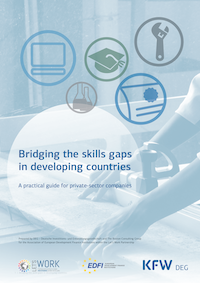
The UNESCO-UNEVOC International Centre: Who We Are | What We Do | Working With Us | Get in Touch
The UNEVOC Network: Learn About the Network | UNEVOC Network Directory
For Members: UNEVOC Centre Dashboard
Thematic Areas: Inclusion and Youth | Digital Transformation | Private Sector Engagement | SDGs and Greening TVET
Our Key Programmes & Projects: BILT: Bridging Innovation and Learning in TVET | Building TVET resilience | TVET Leadership Programme | WYSD: World Youth Skills Day
Past Activities: COVID-19 response | i-hubs project | TVET Global Forums | Virtual Conferences | YEM Knowledge Portal
Our Services & Resources: Publications | TVET Forum | TVET Country Profiles | TVETipedia Glossary | Innovative and Promising Practices | Toolkits for TVET Providers | Entrepreneurial Learning Guide
Events: Major TVET Events | UNEVOC Network News

| Publisher/s: | Deutsche Investitions- und Entwicklungsgesellschaft; The Boston Consulting Group; EDFI |
| Published: | 2016 |
Nine out of ten jobs in developing countries are provided by private-sector companies. Yet globally, 38% of private-sector employers report difficulties in filling vacant positions owing to the unavailability of adequately trained staff. The result is a serious mismatch: on the one hand, all those job vacancies; on the other, vast numbers of job-seekers who do not have the skills (private) employers are looking for. These so-called skills gaps – the difference between the skills needed for a job and those possessed by a worker – represent a major constraint on development.
This report introduces an approach for companies to conduct a cost-benefit appraisal of their measures to address skills gaps – in their own workforce, in the value chain and in the local community.